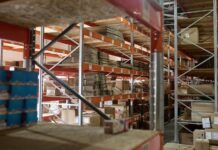Retailers and brands are increasingly turning to Vietnam for manufacturing a wide range of products, from sneakers to sofas, as they shift some or all of their production away from China.
For several years, Vietnam has emerged as a favored alternative for companies aiming to sidestep the fallout from U.S. trade disputes with Beijing. However, with President Donald Trump intensifying his tariff campaign, avoiding these issues has become more challenging.
Trump announced a new set of global tariffs on Wednesday, which includes a staggering 46% duty on imports from Vietnam. This move could significantly increase costs for major players in the apparel & textile, furniture, and footwear industries, potentially leading to price hikes for consumers. The new tariffs will take effect on April 9.
For over two decades, China led the way as the top exporter to the U.S., but in 2023, Mexico overtook China as the leading source of imports. In 2024, China remained the second-largest supplier to the U.S., providing goods valued at $438.9 billion, according to data from the Office of the U.S. Trade Representative.
As companies seek to diversify their production locations and mitigate risks associated with trade disputes with China, Vietnam has become a popular choice. Imports from Vietnam surged to $136.6 billion in 2024, marking a roughly 19% increase from the previous year, according to the Office of the U.S. Trade Representative.
The list of countries affected by the new tariffs has been released. Conversely, imports from China saw only a 2.8% increase from 2023 to 2024, following an 18% drop in the previous year compared to 2022, when the U.S. imported $536.3 billion worth of goods from China.
These new duties will impact companies at a time when consumers are becoming more discerning and value-conscious due to ongoing inflation and economic uncertainties. While it remains uncertain which companies will raise prices as a result of the tariffs, businesses might hesitate to absorb the increased costs, especially given predictions of weak consumer spending in the near future.
Companies Facing Challenges from Vietnam Tariffs
Several well-known brands are likely to be adversely affected by the tariffs imposed on Vietnam. Nike sources approximately half of its footwear from China and Vietnam, with around 25% of its production taking place in Vietnam. Trump has announced a 34% tariff on top of the existing 20% duties on Chinese imports, resulting in an overall rate of 54%. This situation presents additional challenges for Nike, which has already issued a disappointing sales forecast for the upcoming quarter, factoring in the anticipated impacts of tariffs on imports from both China and Mexico.
The expanded tariffs could hinder Nike’s efforts to rejuvenate its brand and improve sales under its new CEO, Elliott Hill, who took the reins last fall. Following the announcement, Nike’s shares dropped over 6% in after-hours trading. Other major footwear brands, like Adidas, also have significant production operations in Vietnam.
In 2023, nearly a third of the footwear imported into the U.S. originated from Vietnam, according to the Footwear Distributors and Retailers of America. Steve Madden indicated during an earnings call in early November that the company intends to reduce its imports from China by as much as 45% over the coming year, just days after Trump was elected, echoing his campaign promises of imposing heavy tariffs on countries like China. Vietnam, along with Cambodia, Mexico, and Brazil, has become a primary focus for the company’s shifting production strategy.
Deckers Brands, the parent company of Ugg and Hoka, is also heavily reliant on Vietnam, ranking as its second-largest supplier country this month, with 68 supply chain partners in Vietnam, compared to 125 in China. Following the tariff announcement, Deckers’ shares fell nearly 9%, and the company did not immediately provide comments.
VF Corporation, known for brands such as The North Face, Timberland, Vans, and Jansport, similarly depends on both China and Vietnam, with 38% of its suppliers located in China and 17% in Vietnam, accounting for 55% of its total exposure. The company’s stock dropped more than 8% in after-hours trading, and it opted not to comment ahead of its upcoming earnings report.
The furniture sector has also significantly increased its reliance on Vietnam, with 26.5% of U.S. furniture imports coming from the country in 2023, closely following the 29% imported from China, according to the Home Furnishings Association. Collectively, this means that about 56% of U.S. furniture imports are sourced from these two regions.
Wayfair’s stock experienced a nearly 12% decline in after-hours trading. The company stated that it is “closely monitoring the evolving trade landscape” and is “well-positioned to continue offering customers the best possible combination of value, assortment, and experience.”
Toy manufacturers, including Hasbro, SpinMaster, Mattel, and Crayola, have also increased their reliance on Vietnam for merchandise aimed at consumers of all ages. GFT Group, one of the largest toy manufacturers in Southeast Asia, operates five production facilities in northern Vietnam, employing over 15,000 workers, in addition to its longstanding factories in China.
Curtis McGill, co-founder of Hey Buddy Hey Pal, a toy company that specializes in Easter egg decorating kits, anticipates that the 46% tariffs will elevate toy prices in the U.S. He noted that manufacturers are likely negotiating with suppliers in Vietnam to mitigate these cost increases, as they face pressure from retailers to maintain pricing.
Future Manufacturing Locations
With the new tariff policies, companies, particularly in the apparel sector, are contemplating whether and where to shift their manufacturing operations. During its most recent earnings call, an investor inquired about American Eagle Outfitters’ exposure to Vietnam.
Chief Financial Officer Michael Mathias stated that the company’s production is evenly split between Vietnam and China, with “high-teens to 20%” of production occurring in each country. He indicated that American Eagle aims to reduce that percentage to single digits later in the year. Following the news, American Eagle’s shares fell more than 5%.
Both Mathias and American Eagle CEO Jay Schottenstein emphasized the importance of remaining flexible as they await clarity on how the tariffs will unfold and which countries may be impacted. Schottenstein reflected on earlier challenges faced during Trump’s first term and acknowledged that another shift is on the horizon, though the specifics remain uncertain.
He advised caution, saying, “I wouldn’t be rushing. You go rush, where am I rushing to? I don’t know where I’m rushing to.”
Peter Baum, Chief Financial Officer and Chief Operations Officer of Baum Essex, a New York-based manufacturer with licenses to produce goods for brands like Nautica, Betsey Johnson, and Steve Madden, noted that during Trump’s first term in 2019, the company moved factories from China to the Philippines, Cambodia, Vietnam, and India. Baum expressed concern about the current situation, stating, “This is how you start a global depression. After 80 years and five generations, Trump just put us out of business.”
































